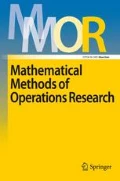Abstract
We consider combinatorial optimization problems with uncertainty in the cost vector. Recently, a novel approach was developed to deal with such uncertainties: instead of a single one robust solution, obtained by solving a min max problem, the authors consider a set of solutions obtained by solving a min max min problem. In this new approach, the set of solutions is computed once and we can choose the best one in real time each time a cost vector occurs yielding better solutions compared to the min max approach. In this paper, we apply the new approach to the absolute and relative regret cases. Algorithms to solve the min max min robust (relative) regret problems are presented with computational experiments.
Similar content being viewed by others
References
Aissi H, Bazgan C, Vanderpooten D (2009) Min–max and min–max regret versions of combinatorial optimization problems: a survey. Eur J Oper Res 197(2):427–438
Averbakh I (2005) Computing and minimizing the relative regret in combinatorial optimization with interval data. Discrete Optim 2:273–287
Boffey TB, Karkazis J (1984) p-Medians and multi-medians. J Oper Res Soc 35(1):57–64
Buchheim C, Kurtz J (2016) Min–max–min robustness: a new approach to combinatorial optimization under uncertainty based on multiple solutions. Electron Not Discrete Math 52:45–52
Buchheim C, Kurtz J (2017) Min–max–min robust combinatorial optimization. Math Program 163(1–2):1–23
Chassein A, Goerigk M, Kurtz J, Poss M (2019) Faster algorithms for min–max–min robustness for combinatorial problems with budgeted uncertainty. Eur J Oper Res 279(2):308–319
Candia-Véjar A, Alvarez-Miranda E, Maculan N (2011) Minmax regret combinatorial optimization problems: an alogorithmic perspective. RAIRO-Oper Res 45:101–129
Carlsson C, Fuller R (2012) Fuzzy reasoning in decision making and optimization. Physica, vol 82. Springer, Berlin
Chassein A, Goerigk M (2016) Performance analysis in robust optimization. In: Doumpos M, Zopounidis C, Grigoroudis E (eds) Robustness analysis in decision aiding, optimization, and analytics. International series in operations research and management science, vol 241. Springer, Cham
Crema A (2000) An algorithm for the multiparametric 0–1-integer linear programming problem relative to the objective function. Eur J Oper Res 125:18–24
Crema A (2014) Mathematical programming approach to tighten a Big-\(M\) formulation. www.optimization-online.org. Accessed Aug 2014
Hanasusanto G, Kuhn D, Wiesemann W (2015) K-adaptability in two-stage robust binary programming. Oper Res 63(4):877–891
Kasperski A, Zielinski P (2016) Robust discrete optimization under discrete and interval uncertainty: a survey. In: Doumpos M, Zopounidis C, Grigoroudis E (eds) Robustness analysis in decision aiding, optimization, and analytics. International series in operations research and management science. Springer, Berlin
Kouvelis P, Yu G (2013) Robust discrete optimization and its applications, vol 14. Springer, Berlin
Li J, Liu Y (2016) Approximation algorithms for stochastic combinatorial optimization problems. J Oper Res Soc China 4(1):1–47
Megiddo N (1979) Combinatorial optimization with fractional objective functions. Math Oper Res 4(4):414–424
Montemanni R, Gambardella LM (2005) The robust shortest path problem with interval data via Benders decomposition. 4 OR 3:315–328
Oberdieck R, Diangelakis NA, Nascu I, Papathanasiou MM, Sun M, Avraamidou S, Pistikopoulos EN (2016) On multi-parametric programming and its applications in process systems engineering. Chem Eng Res Des 116:61–82
Author information
Authors and Affiliations
Corresponding author
Additional information
Publisher's Note
Springer Nature remains neutral with regard to jurisdictional claims in published maps and institutional affiliations.
Appendices
Appendix A: Proof of Proposition 1
-
(i)
Let \(\mathbf {c} \in \varOmega \) and let \(\mathbf {h},\mathbf {x} \in X\).
-
Let \(I_{1,0} = \lbrace i: \mathbf {h}_i = 1,\mathbf {x}_i = 0,\;\;1 \le i \le n \rbrace \)
-
Let \(I_{0,1} = \left\{ i: \mathbf {h}_i = 0,\mathbf {x}_i = 1,\;\;1 \le i \le n \right\} \)
then:
$$\begin{aligned} \mathbf {c}^t \mathbf {h} - \mathbf {c}^t \mathbf {x} = \sum _{i \in I_{1,0}} \mathbf {c}_i - \sum _{i \in I_{0,1}} \mathbf {c}_i \le \sum _{i \in I_{1,0}} \mathbf {U}_i - \sum _{i \in I_{0,1}} \mathbf {L}_i = {\mathbf {c}^{+}(\mathbf {x})}^t \mathbf {h} - {\mathbf {c}^{+}(\mathbf {x})}^t \mathbf {x} \end{aligned}$$ -
-
(ii)
Let \(\mathbf {x} \in X\) and let \(\mathbf {c} \in \varOmega \). Let \(\mathbf {h}\) be an optimal solution for \(P(\mathbf {c}^+(\mathbf {x}))\).
-
Let \(I_{1,0} = \lbrace i: \mathbf {h}_i = 1,\mathbf {x}_i = 0,\;\;1 \le i \le n \rbrace \)
-
Let \(I_{0,1} = \left\{ i: \mathbf {h}_i = 0,\mathbf {x}_i = 1,\;\;1 \le i \le n \right\} \)
then:
$$\begin{aligned}&0 < {\mathbf {c}^+(\mathbf {x})}^t \mathbf {x} - v(P(\mathbf {c}^+(\mathbf {x}))) = {\mathbf {c}^+(\mathbf {x})}^t \mathbf {x} - {\mathbf {c}^+(\mathbf {x})}^t\mathbf {h}\\&\quad = \sum _{i \in I_{0,1}} \mathbf {L}_i - \sum _{i \in I_{1,0}} \mathbf {U}_i\le \sum _{i \in I_{0,1}} \mathbf {c}_i - \sum _{i \in I_{1,0}} \mathbf {c}_i = \mathbf {c}^t \mathbf {x} - \mathbf {c}^t \mathbf {h} \end{aligned}$$therefore: \(v(P(\mathbf {c})) \le \mathbf {c}^t \mathbf {h} < \mathbf {c}^t \mathbf {x}\).
-
-
(iii)
Let \(\mathbf {x} \in X\) and let \(\mathbf {c} \in \varOmega \), then: \(\mathbf {c}^{+}(\mathbf {x})^t \mathbf {x} \overset{(1)}{=} \mathbf {L}^t \mathbf {x} \overset{(2)}{\le } \mathbf {c}^t \mathbf {x}\) where (1) From the definition of \(\mathbf {c}^+(\mathbf {x})\) and (2) Since \(\mathbf {L} \le \mathbf {c}\;\;\bullet \).
Appendix B: Proof of Proposition 2
Let \(X \subseteq {\lbrace 0,1 \rbrace }^n\). Let \(f:X \longmapsto \mathbb {R}\) and \(g:X \longmapsto \mathbb {R}\) with \(f(\mathbf {x}) > 0\) and \(g(\mathbf {x}) > 0\) for all \(\mathbf {x} \in X\). Let P1 be a problem in (\(\mathbf {x}\)) defined as:
Let \(\mu \ge 0\) and let \(P2(\mu )\) be a problem in (\(\mathbf {x}\)) defined as;
then:
If \(v(P2(\mu )) = 0\) then \(f(\mathbf {x}) - \mu g(\mathbf {x}) \le 0\) for all \(\mathbf {x} \in X\), therefore \(\frac{f(\mathbf {x})}{g(\mathbf {x})} \le \mu \) for all \(\mathbf {x} \in X\) and we have \(v(P1) \le \mu \). If \(v(P2(\mu )) = 0\) and \(v(P1) < \mu \) we have \(\frac{f(\mathbf {x})}{g(\mathbf {x})} < \mu \) for all \(\mathbf {{x} \in X}\) and then \(f(\mathbf {x}) - \mu g(\mathbf {x}) < 0\) for all \(\mathbf {x} \in X\) and we have a contradiction.
If \(\mu = v(P1)\) and \(v(P2(\mu )) > 0\) then we have \(\frac{f(x)}{g(x)} > \mu = v(P1)\) for some \(\mathbf {x} \in X\) and we have a contradiction, therefore \(v(P2(\mu )) \le 0\). If \(\mathbf {x}^*\) is an optimal solution for P1 then we have \(f(\mathbf {x}^*) - \mu g(\mathbf {x}^*) = 0\) and then \(v(P2(\mu )) \ge 0\) and finally \(v(P2(\mu )) = 0\).
Hence we have:
-
(1)
\(v(P2(\mu )) = 0\) if and only if \(\mu = v(P1)\).
If \(v(P2(\mu )) = 0\) and \(\mathbf {x}^*\) is an optimal solution for \(P2(\mu )\) we have \(v(P2(\mu )) = f(\mathbf {x}^*) - \mu g(\mathbf {x}^*) = f(\mathbf {x}^*) - v(P1) g(\mathbf {x}^*) = 0\) and then \(v(P1) = \frac{f(\mathbf {x}^*)}{g(\mathbf {x}^*)}\), therefore \(\mathbf {x}^*\) is an optimal solution for P1. Hence we have:
-
(2)
If \(v(P2(\mu )) = 0\) and \(\mathbf {x}^*\) is an optimal solution for \(P2(\mu )\) then \(\mathbf {x}^*\) is an optimal solution for P1.
Let \(X = \lbrace \mathbf {x}^{(1)},\ldots ,\mathbf {x}^{(L)} \rbrace \) then
\(v(P2(\mu )) = \max \lbrace f(\mathbf {x}^{(1)}) - \mu g(\mathbf {x}^{(1)}),\ldots ,f(\mathbf {x}^{(L)}) - \mu g(\mathbf {x}^{(L)}) \rbrace \).
Since \(g(\mathbf {x}) > 0\) for all \(\mathbf {x} \in X\) then we have:
-
(3)
\(v(P2(\mu ))\) is a piecewise linear and decreasing function in \(\mu \).
We have:
Let \(f(\mathbf {x}) = \underset{ \mathbf {h} \in H}{\min }\;\; \mathbf {c}^{+}(\mathbf {x})^t \mathbf {h}\) and let \(g(\mathbf {x}) = \mathbf {c}^{+}(\mathbf {x})^t \mathbf {x}\). We use (1),(2) and (3) to find:
-
(i)
\(v(RX_r(\mu ,H)) = 0\) if and only if \(\mu = v(QX_r(H)) + 1\).
-
(ii)
If \(v(RX_r(\mu ,H)) = 0\) and \(\mathbf {x}^*\) is an optimal solution for \(RX_r(\mu ,H)\) then \(\mathbf {x}^*\) is an optimal solution for \(QX_r(H)\).
-
(iii)
\(v(RX_r(\mu ,H))\) is a piecewise linear and decreasing convex function in \(\mu \;\;\bullet \)
Appendix C: Proof of Proposition 3
Let \(X = \lbrace \mathbf {x}^{(1)},\ldots ,\mathbf {x}^{(L)} \rbrace \), let \(\phi _j = \underset{\mathbf {h} \in H}{\min }\;\; {\mathbf {c}^+(\mathbf {x}^{(j)})}^t \mathbf {h}\) and let \(\delta _j = {\mathbf {c}^+(\mathbf {x}^{(j)})}^t \mathbf {x}^{(j)}\) for \(j=1,\ldots ,L\).
The algorithm may be rewritten as follows:
Let \(\mu _1 = 1\).
Algorithm Find-\(\mu ^*\)
-
1.
\(i=1\).
-
2.
Solve \(R_r(\mu _i,H)\). Let \(\mathbf {x}^{(j_i)}\) be an optimal solution.
-
3.
If \( v(R_r(\mu _i,H)) = 0\) let \(\mu ^* = \mu _i\), let \(\mathbf {x}^* = \mathbf {x}^{(j_i)}\) and stop.
-
4.
Let \(\mu _{i+1} = \frac{\phi _{j_i}}{\delta _{j_i}}\), let \(i=i+1\) and return to Step 2.
If \(v(R_r(\mu _1,H)) > 0\) then \(\mu _2 = \frac{\phi _{j_1}}{\delta _{j_1}}\) and \(\phi _{j_1} - \mu _1 \delta _{j_1} > 0\). Hence \(\mu _2 > 1 = \mu _1\).
If \(v(R_r(\mu _2,H)) > 0\) then \(\mu _3 = \frac{\phi _{j_2}}{\delta _{j_2}}\) and \(\phi _{j_2} - \mu _2 \delta _{j_2} > 0\). Hence \(\mu _3 > \mu _2\).
In general we have that \(\mu _i < \mu _{i+1}\) for all i. Since X is a finite set then the sequence \(\mu _1,\ldots ,\mu _s,\ldots \) generated by the algorithm must be finite and then \( v(R_r(\mu _i,H)) = 0\) for some i (otherwise the algorithm generates an infinite sequence of \(\mu \)-values).
Appendix D
See Tables 4, 5, 6, 7, 8, 9, 10, 11, 12, 13, 14 and 15.
Rights and permissions
About this article
Cite this article
Crema, A. Min max min robust (relative) regret combinatorial optimization. Math Meth Oper Res 92, 249–283 (2020). https://doi.org/10.1007/s00186-020-00712-y
Received:
Revised:
Published:
Issue Date:
DOI: https://doi.org/10.1007/s00186-020-00712-y




